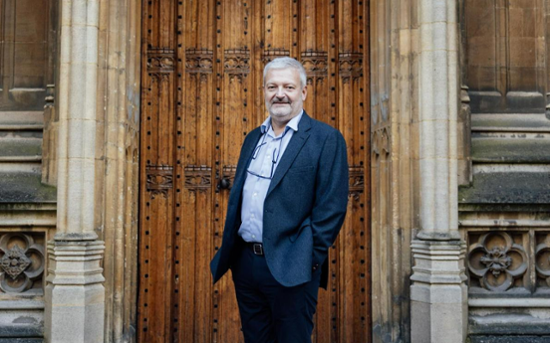By Lee Kyung-min
EBC Financial Group CEO David Barrett
The lack of honesty in the conversation about climate change is the most urgent issue before deliberating the cost in financial and social change terms, according to a noted macro and environmental expert.
A lack of clarity distorts the message, fractures the arguments for action, and pretends that potential solutions can be achieved in easy bites, CEO of EBC Financial Group (UK) Ltd., said in an interview with The Korea Times. Based in London, EBC Financial Group is a globally leading broker, offering multi-asset class financial brokerage in forex, indices, shares, and commodities.
He was a panelist at What Economists Really Do (W.E.R.D.), jointly held by Oxford University on topics ranging from the climate crisis to labor market discrimination. They discuss policies to make the economy work better for everyone.
“Policy, in the West, is constructed with an election cycle firmly in mind,” he said. “The real responsibility lies with voters making sure they elect people to work for them rather than for the party they represent.”
The financial markets can help deliver huge change and massive innovation to overcome the issues, but they will not do it without encouragement.
“Markets are there to serve their clients and themselves, they require a return for their efforts — given that incentive and they will be onboard to help facilitate policy.”
ESG on the surface?
Most will, he said, produce a sustainability report that includes net zero goals, social goals, environmental projects, and physical impacts of their platform, etc.
“Some would argue that this is a solid step on the road to true corporate responsibility, others that it is just posturing to deflect criticism and bow to political pressure to tow the line. Either way we seem to have spawned a new industry that many feel obliged to enact.”
In a real-world sense, he added, many would criticize these efforts, saying that they are conducting politically correct box ticking so that they gain a better media profile — the real test being what they do day to day and the real amount of change they produce.
“Personally, I find it hard to read a multinational fossil fuel company’s net-zero goals and find them to be realistic. Indeed, BP has been heavily criticized of late for performing a U-turn on its green policies and returning to a fossil fuel based business plan. The recent election results could well see more of the political pressure being reduced and other industries retreating from past promises.”
Korea
The recent steps announced by the Korean government with the Office of Sustainable Growth looks to bring together initiatives that have been pursued separately within the government, in Barrett’s view.
Policymakers “may look for a more integrated planning regime as well as pushing for broader domestic and overseas cooperation to help with policy development. While these appear to be steps in the right direction, they still seem modest if they are to come close to the 2050 carbon-neutral targets already in place.”
The political election cycle has caused policy implementation to be patchy at best, in his view, to make the changes Korean voters need to demand a macro approach to policy that stretches across the political spectrum.
“The private sector is dominated by large conglomerates like Hyundai and Samsung and local environmental groups have been loud critics of their so-called ‘greenwashing’ and political interference to slow environmental standard changes and regulation. This has to change for progress to be made.”
Greenwashing is a deceptive practice where a company or entity misleads the public about its environmental impact.
Historically the private sector has been an engine of economic growth, but also is responsible for a lot of environmental damage and emissions while pursuing profits and growth, he added.
“As we have become able to identify the causes and impacts of pollution, it has become clear that much of the adverse environmental impacts come from a small section of the sector.”
He expressed strong optimism that the private sector could play a key role in driving grassroots change.
“I do not think they should be made to shoulder this burden without assistance, but their positioning within communities and the innovation entrepreneurs often bring to the table makes them an excellent avenue to change. The image they have in the communities that they exist in have become a large part of how they sell their products, so many are leading the way in change.”


